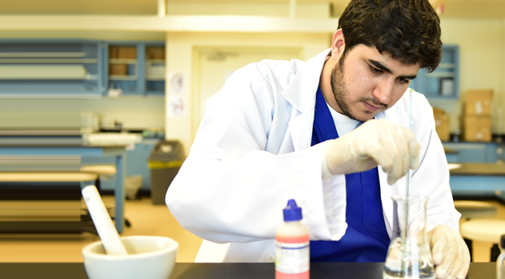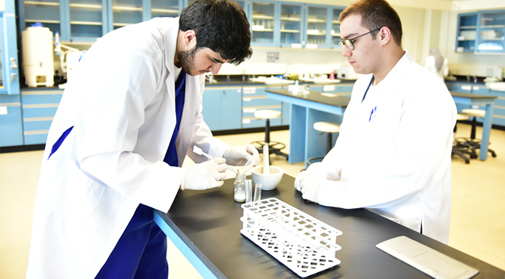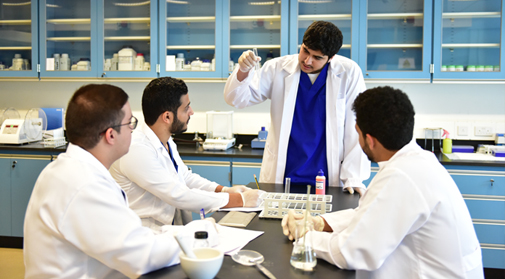Faculty Research
Dr Manal M Alem, |
My research background involves clinical studies focusing on cardiovascular risk factors. As an example, arterial stiffness is now a recognized and independent cardiovascular risk factor. It can be assessed non-invasively via the shygmocardiography technique. This involves using a bedside technology that records the radial artery pulse wave and utilizes that to derive central aortic pulse wave, central arterial blood pressure and related indices such as augmentation index, aortic pulse wave velocity, and brachial pulse wave velocity. All of these indices will give a comprehensive idea about the biological age of the arterial tree. With this, it may be found that an individual’s arterial tree may be as old as, younger than, or older than his/her chronological age.
Inter-related pathological processes such as endothelial dysfunction, left ventricular mass, and oxidative stress are other areas of interest that I like to investigate. These research interests fascinate me because cardiovascular risk factors can be modified favourably by current pharmacological agents well established for other indications. If a patient takes one medicine for normalizing his/her blood pressure, it would be extremely interesting to find out if it can reduce arterial stiffness, improve insulin sensitivity, or improve endothelial function as well.
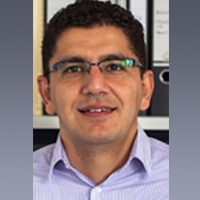 |
Dr. Mohammed Khanfar |
Dr. Khanfar’s research involves the use of state of the art pharmaceutical, computational and medicinal chemistry technologies to design, synthesize and evaluate new molecules for the treatment of human disease and to probe biological systems with a particular emphasis on cancer and neurodegenerative diseases. Dr. Khanfar’s research focuses on developing novel computational and molecular modeling technologies to understand protein-drug interactions and to design and discover novel and active drugs. His research team uses the many existing methods of computer-aided drug design, such as multidimensional QSAR, docking, conformational analysis, and pharmacophore modeling for understanding drug action and designing and discovering new therapeutics. Alternatively, Dr. Khanfar applied synthetic and medicinal chemistry techniques to design and synthesis new therapeutics targeting oncology and neurodegenerative diseases. For example, Dr. Khanfar synthesized very potent mTOR inhibitors as anticancer agents and selective SIRT2 inhibitors targeting Huntington's disease.
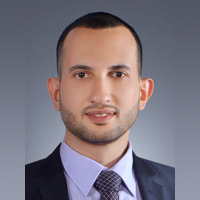 |
Dr. Ibrahim M. Salman |
My primary research goal is to better understand how the autonomic nervous system controls cardiovascular functions, both under normal conditions and in the presence of pathological disorders that elevate blood pressure. A myriad of clinical conditions presents with high blood pressure including, but not limited to, essential hypertension, chronic kidney disease, obesity and sleep apnea. As these conditions continue to become more prevalent, the cardiovascular disease that accompanies them also becomes a major health issue worldwide. In fact, many of these conditions alter how the brain controls blood pressure, but the mechanisms underlying this effect are poorly understood. We believe that the disease process progressively impacts the autonomic neuroregulation of cardiovascular function, thereby contributing central deficits in both tonic and reflex control of blood pressure. To systematically investigate this, we employ a multi-disciplinary research approach ranging from whole animal physiology and pharmacology to electrophysiology (e.g., whole fiber neural recordings and neurostimulation). These experimental strategies are generally integrative and allow for acute and chronic measurements of blood pressure, organ perfusion and whole nerve activity (e.g., vagus nerve, aortic nerve and a range of sympathetic nerve beds) in conscious and anesthetized rats. A major focus of our current research activity is elucidating the impact of neural laterality on central integration of baroreceptor afferent input and how this would modulate overall reflex hemodynamic control under normal and high blood pressure conditions. A second recent focus of our research is to understand the pathophysiological link between neuromodulation of renal nerve activity and the expression of cardiorespiratory functions in the Zucker fat rat model of obesity-related hypertension and sleep apnea. A comprehensive research profile can be found here.
 |
Dr.Omar Z. Ameer |
Research interests: My research focuses on investigating mechanisms underlying the antihypertensive effects of drugs, xenobiotics or plant-based medicinal compounds, and assessing pathways altering endothelial and non-endothelial dependent signalling mechanisms within the vasculature. This involves the use of a range of experimental approaches including in-vitro isolated tissue preparation and organ bath studies as well as in-vivo monitoring of cardiovascular parameters in conscious and anaesthetized animal studies. Furthermore, my work involves neurostimulation of selected neurovascular beds in different rats to assess hemodynamics and altered target-organ perfusion in many pathophysiological or drug-induced conditions. Another area of my research is dedicated to investigating modulation of arterial functionality in various cardiovascular pathological conditions (e.g., hypertension, diabetes, chronic kidney disease) and its potential contribution to the increased risk of morbidity and mortality in this population. We also employ the use of engineering elastic modulus and stress-strain relationship to assess vascular stiffness. This is backed up by measurements of tissue and biochemical pathological markers and comprehensive histomorphometric analyses of histological sections acquired from arterial specimens. To this end, we assess changes in structural arterial components including, but not limited to, elastin, collagen and calcium in response to elevated blood pressure. My current project activity involves investigation of regional functional and structural aortic functions in insulin-resistant high fat diet rat model. For a comprehensive list of publications, please refer to the following link.
 |
Ahmed H. Aljedai, Pharm.D., MBA, BCPS, FCCP, FAST, FCCP, FASHP, BCTxP |
Prof. Aljedai earned his Doctorate Degree (Pharm. D.) from the University of Health Sciences and Pharmacy in St. Louis, MO, USA and completed a general pharmacy practice residency and a specialty residency in immunology and solid organ transplant pharmacotherapy at the University of Tennessee, Memphis, TN, USA. During this time he obtained his Master of Business Administration (MBA) as well. He is board certified as Pharmacotherapy Specialist (BCPS), Board Certified as Transplant Pharmacotherapy Specialist (BCTxP), a Fellow of the American College of Chest Physicians (FCCP), a Fellow of the American Society of Transplantation (FAST), a Fellow of the American College of Clinical Pharmacy (FCCP) and a fellow of the American Society of Health System Pharmacy (FASHP). He works currently as the Assistant Deputy Minister for Therapeutic Affairs, Ministry of Health, Saudi Arabia. He is the founding president of the Saudi Clinical Pharmacy Society (SSCP). Riyadh, Saudi Arabia. He is a Professor at Al-Faisal University, Schools of Medicine and Pharmacy and the editor-in-chief of the Saudi Journal of Clinical Pharmacy. He was the past chairman of the scientific board of pharmacy in Saudi Arabia. He works as a consultant clinical pharmacist with the solid organ transplant. He is a member of the advisory board of 5 different schools of pharmacy in Saudi Arabia and many peer reviewed journals such as the Journal of the American Pharmacy Association (JAPhA) and Journal of American College of Clinical Pharmacy (JACCP).
He has held several consultancy positions at the world Health Organization (WHO), Saudi Food and Drug Authority (SFDA), and the Saudi Commission for Health Specialties (SCFHS).
He has presented more than a thousand presentations over the years locally and internationally and published more than 140 original peer-reviewed research papers in the medical and pharmaceutical journals in addition to 4 textbooks chapters related to transplant pharmacotherapy, pharmacy practice, health technology assessment and administration
 |
Abdulrazaq S. Al-Jazairi, |
Dr. Al-Jazairi is a Clinical Pharmacy Consultant in the field of Cardiovascular Pharmacotherapy and the Director of Pharmaceutical Care Division at the prestigious King Faisal Specialist Hospital and Research Center (KFSH&RC), Riyadh Saudi Arabia. He received his Doctor of Pharmacy degree from Campbell University at Buies Creek, North Carolina, USA, and a general Pharmacy Practice Residency at Duke University Medical Center (DUMC), Durham, NC. In 2000, Dr. Al-Jazairi completed a two-year Specialty Residency in Cardiovascular Pharmacotherapy from Philadelphia College of Pharmacy (PCP), University of the Sciences in Philadelphia in conjunction with the Hospital University of Pennsylvania (HUP), Philadelphia, Pennsylvania. More recently, 2014, Dr. Al-Jazairi earned a Master degree in Pharmaceutical and Healthcare Business from Mayes College, University of the Sciences in Philadelphia. Dr. Al-Jazairi is a board certified pharmacotherapy specialist with Cardiology added-qualification.
Dr. Al-Jazairi has more than 30 original research publications, and delivered many national and international presentations. Dr. Al-Jazairi is the Lead Founder of the Saudi Clinical Pharmacy Society, 2018. Currently he is chairing the Saudi Scientific Pharmacy Board. He is an editorial board member of prime journals, including Annals of Pharmacotherapy and the Annals of Saudi Medicine, for more than 10 years. He sets in several committees in Saudi-FDA, Saudi Commission for Health Specialties and Saudi Health Council. He is also chaired the Clinical Research Committee in the Research Center at KFSHRC- Riyadh for the three terms. Dr. Al-Jazairi enjoys training students and residents in Cardiology and Evidence-based Medicine. Dr. Al-Jazairi is the Director of the first and only Cardiology Residency Program accredited by ASHP outside the States, at King Faisal Specialist Hospital and Research Center (KFSH&RC). He also serves as an Associate Professor, School of Pharmacy in Qassim University, Al-Faisal University, and adjunct Assistant Professor in Princess Nora University, Riyadh, Saudi Arabia.
 |
Dr. Adeola Tawakalitu KOLA-MUSTAPHA |
Dr. Adeola Kola-Mustapha’s research dwells on the science of improving the presentation, physicochemical attributes, and delivery of pharmaceutical substances to ensure that better therapeutic outcomes are derived from them across different categories of patients. From modifying synthetic drug molecules and drug repurposing to developing novel dosage forms from plant extracts, Dr. Kola-Mustapha’s research efforts have been channeled towards enhancing the solubility, stability, safety, and efficacy of important drug principles over the years.
As the world continues to tilt towards the abundant prospects offered by plant parts in drug discovery and development, Dr. Kola-Mustapha’s research interest in drug enhancement (for optimal performance) also extends to the intricacies of phytomedicine. To ensure that plant extracts which are typically used in their crude forms, achieve the highest forms of therapeutic advantage with minimal risks of contamination and drug degradation, Dr. Kola-Mustapha devotes significant research attention to the validation of claims of action, and design of easy- to-use plant-based dosage forms with potentials for bench-to-bedside translation and prospects of commercialization in the nearest future.
Dr. Kola-Mustapha’s research trajectory has been dynamic and is tailored towards responding to the evolving clinical needs of patients across the globe, especially those in vulnerable groups. To achieve this, she is utilizing her expertise in pharmaceutical formulation, herbal science, and dosage form development, infused with the latest trends in industrial technology and bioinformatics.
 |
Dr.Muthanna Albaldawi |
My research strategy focuses on leveraging advanced drug delivery systems to enhance drug transport across biological barriers.
Key areas of focus involve synthesizing amphiphilic di-block copolymers through RAFT polymerization, resulting in nanoparticles with well-defined particle sizes and zeta potential characteristics. Such polymerization techniques enable us to design nanoparticulate carriers based on virus-like nanoparticle technology with efficient loading of protein and peptide agents while ensuring protection against enzymatic degradation. My interest in protein delivery also encompasses studying the pharmacokinetics and pharmacodynamics properties of orally administered peptide and protein agents in vivo. In parallel, I employ the multiple particle tracking (MPT) technique to investigate the kinetic of diffusion of various nanoparticulate systems through biological barriers such as mucus and bacterial biofilms, utilizing Epifluorescence microscopy to visualize particle trajectories. I also use MPT technique to provide insights into the microstructure and mechanical properties of such biological barriers or any biopolymer system.
Another key area involves exploring strategies to improve the bioavailability of Class II and IV drugs, including crystallization and co-crystallization techniques, as well as the design of nano-delivery platforms. My research interest further includes the formulation of controlled-release delivery systems aims at enhancing patient adherence. Another area of interest is conducting analytical studies to understand the deviation in therapeutic response between brand and generic medicines.
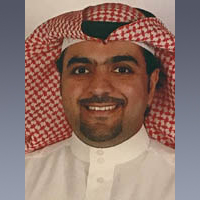 |
Dr.Nasser Alqahtani |
Dr.Nasser Alqahtani works for the first Central Health Cluster – Ministry Of Health (MOH) as an executive director for drug and pharmaceutical affairs and acting executive director for population health management directorate. He is one of the Alfaisal University’s faculty members and works as an adjunct assistant professor of pharmacoepidemiology and Pharmacoeconomics He used to serve as a director for drug safety and risk management dept at Saudi Food and Drug Authority (SFDA) for 13 consecutive years.
He receives his B.S. in Pharmacy from King Saud University, M.Sc. in clinical pharmacy from the UCL - UK and Ph.D. in pharmaceutical policy and outcomes research (Major: Pharmacoepidemiology) from Auburn University – Alabama, USA. He holds a certificate of higher diploma in pharmacovigilance and pharmacoepidemiology from London School of Hygiene and Tropical Medicine (LSHTM).
He is a member of a couple of professional societies: the International Society for Pharmacoepidemiology (ISPE), International Society of Pharmacovigilance (ISOP) International Society of pharmacoeconomics and outcomes research (ISPOR) American Association of Pharmaceutical Scientists (AAPS). Besides, he is a chairman of the national evidence-based practice committee at Saudi Health Council (SHC) He is a reviewer for certain number of peer-reviewed journals, namely; the Pharmacoepidemiology and Drug Safety (PDS) journal, Saudi pharmaceutical journal (SPJ), and Saudi journal of health sciences. He, also, used to chair the scientific committee, member of ethics committee of the SFDA’s research center, and a senior research associate for the medication safety research chair-KSU. He is a member of the national pharmacovigilance Advisory Committee and national drug pricing committee - SFDA. He is one of the members who established the national pharmacovigilance system in Saudi Arabia. Dr. Alqahtani is a research collaborator with the Observational Health Data Sciences and Informatics (OHDSI) organization housed in Columbia University – New York, USA
His area of research focuses on the development and application of epidemiologic and statistical methods for evaluating the safety of medical products and patterns of their utilization in large healthcare databases.
 |
Dr.Khalid Taher, BPharm, PharmD, BCPS, BCPPS |
Dr. Khalid Taher is a pediatric clinical pharmacy consultant and the manager of the satellite pharmacies at King Faisal Specialist Hospital and Research Centre (KFSHRC) in Riyadh, Saudi Arabia. He is also a senior lecturer at Alfaisal University and clinical assistant professor at Princess Nourah Bint Abdulrahman University in Riyadh, Saudi Arabia.
For his education and training, Dr. Taher has been working at KFSHRC since 2012 after he received his bachelor’s degree in pharmaceutical sciences from King Saud University, Riyadh, Saudi Arabia. He completed his ASHP-accredited PGY-1 pharmacy residency at KFSHRC in 2015. After that, he received a scholarship to the United States where he completed his doctor of pharmacy degree at Western University of Health Sciences in California, and his PGY-2 pediatric residency at University of Oklahoma and Oklahoma Children’s Hospital in Oklahoma. He is double board certified in pharmacotherapy (BCPS) since 2018 and in pediatric pharmacy (BCPPS) since 2022.
For his research, his primary research interest focuses on pediatric critical care, emergency medicine, and neurology/psychology. He has served as a reviewer for several prestigious journals, including the Saudi Journal of Clinical Pharmacy (SJCP), Pharmacotherapy, American College of Clinical Pharmacracy (ACCP), American Journal of Health-System Pharmacy (AJHP), and Journal of Contemporary Pharmacy Practice (JCPP). Notably, in September 2024, Dr. Taher was honored with the Best Reviewer Award by the SJCP.
 |
Abdullah Mohammed Alrajhi |
My research interests revolve around the clinical characteristics and outcomes of lymphoma, leukemia, and benign hematological malignancies. I am particularly focused on analyzing patient data to identify factors that influence treatment responses and overall survival, with the goal of optimizing care for individuals affected by these conditions.".
In addition to my clinical research, I am keenly interested in cancer policy and Pharmacoeconomics. I aim to investigate how healthcare policies impact access to treatment and patient outcomes, while also assessing the cost-effectiveness of various therapeutic interventions to ensure that quality care is both affordable and accessible for all patients.
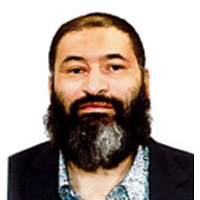 |
Dr.Khalid Taher, BPharm, PharmD, BCPS, BCPPS |
I’m a medicinal chemist with an academic and a research background, currently affiliated with Alfaisal University, Riyadh, Saudi Arabia. I completed my PhD (October 2023) at Monash Institute of Pharmaceutical Sciences (MIPS, Monash University) in Medicinal Chemistry, focusing on the structural and functional characterisation of novel peptide toxins derived from Australian sea anemones. My PhD project involved the synthesis and recombinant expression of these peptides, along with extensive structural studies utilising advanced techniques such as RP-HPLC, LCMS, NMR spectroscopy and molecular dynamics simulations. My research is revolved around the 3D structural determination of several novel peptides with potential therapeutic applications including cytotoxic, Kv channel blocking and TRPV1- blocking (analgesic) activities, thereby contributing significantly to the field of drug discovery.
Prior to my PhD, I earned a master’s degree in Pharmaceutical Sciences, specialising in Phytochemistry and Analytical Chemistry, where I developed cost-effective chromatographic methods for qualitative and quantitative determination of therapeutically active compounds in pharmaceutical products.
My research interests lie at the intersection of medicinal chemistry and natural product chemistry. I am particularly passionate about exploring bioactive peptides from marine organisms and their potential applications in various medical conditions.
In addition to my research pursuits, I have actively contributed to the academic community through publications in prestigious journals and presentations at various scientific conferences.


